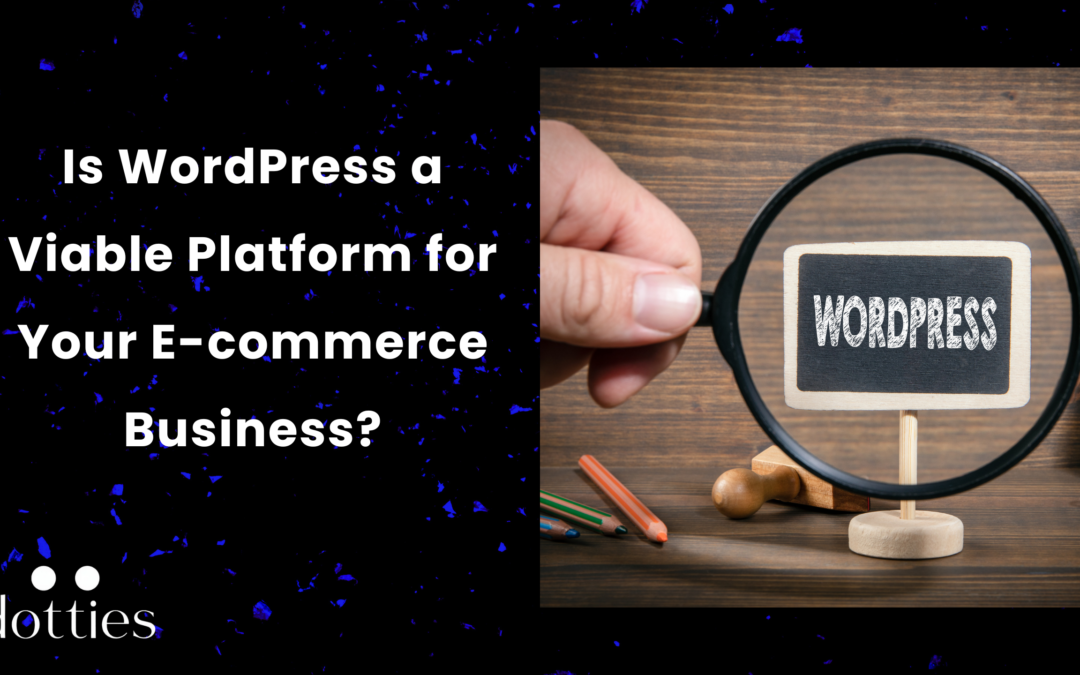Is WordPress a Viable Platform? Choosing the right platform is one of the most critical decisions for any business. Your website serves as your online storefront, shaping your brand image and customer experience while driving sales. With countless options available, many business owners wonder if WordPress, primarily known as a content management system, is a strong contender for building an e-commerce store.
The short answer is yes—but it depends on your specific needs and resources. Let’s dive into why WordPress could be a powerful solution for your e-commerce business and some factors to keep in mind before committing.
The Power of Flexibility and Customization

One of WordPress’s most remarkable attributes is its unmatched flexibility. Unlike dedicated e-commerce platforms like Shopify or BigCommerce, WordPress isn’t limited to a particular design, layout, or feature set. This open-source platform allows you to create and modify your website to suit virtually any vision or functionality.
For e-commerce, this means you can build an online store that fully reflects your brand’s personality. Whether you want sleek minimalism, bold visuals, or interactive elements, WordPress offers endless possibilities. Thousands of customizable themes and plugins enable you to tailor your store’s appearance and functionality. For example, you can implement advanced search filters, personalized shopping experiences, or unique checkout processes to stand out in the competitive market.
WooCommerce: Transforming WordPress into an E-commerce Powerhouse
At the heart of WordPress’s e-commerce capabilities is WooCommerce. As one of the most popular e-commerce plugins globally, WooCommerce provides everything you need to turn a WordPress website into a fully functional online store. It supports essential features such as:
- Product Listings: Showcase your products with customizable layouts.
- Payment Gateways: Accept payments through popular options like PayPal, Stripe, and others.
- Shipping Options: Define shipping rates and regions with ease.
- Tax Management: Automate tax calculations based on customer location.
What sets WooCommerce apart is its extensibility. Numerous free and premium WooCommerce extensions allow you to add advanced capabilities, such as subscriptions, bookings, or dropshipping support. This makes WordPress with WooCommerce suitable for various industries, from fashion and electronics to digital products and services.
Scalability to Support Growth
Scalability is essential for any business anticipating growth, and WordPress shines in this area. Whether you’re starting with a small product catalog or managing thousands of SKUs, WordPress can grow with you. As your traffic and product range increase, you can scale your hosting plan and implement performance optimizations, such as caching and Content Delivery Networks (CDNs), to ensure your site remains fast and reliable.
Moreover, the ability to add plugins or integrate third-party tools means you can continually enhance your store’s functionality. For example, you might start with basic inventory management but later adopt sophisticated tools for automated stock replenishment or sales forecasting. This adaptability ensures that your online store evolves alongside your business needs.
Cost-Effectiveness: Maximizing ROI
Cost is often a deciding factor when choosing an e-commerce platform, and WordPress stands out as a budget-friendly option. While there are initial expenses for purchasing themes, plugins, and hosting, WordPress offers more control over your costs compared to subscription-based platforms like Shopify.
Additionally, WordPress doesn’t charge transaction fees, which can significantly impact your margins on platforms with per-sale charges. The availability of free plugins and themes further reduces the upfront investment, making WordPress an attractive choice for startups and small businesses aiming to establish a professional online presence without breaking the bank.
Maintenance and Technical Considerations
Despite its benefits, WordPress requires regular maintenance to ensure smooth operation. As an open-source platform, it relies on updates to themes, plugins, and the core software for security and performance. If these updates are neglected, your site may become vulnerable to cyberattacks or experience compatibility issues.
Business owners without technical expertise may find this maintenance daunting. While hiring a developer or opting for managed WordPress hosting can alleviate this burden, it’s an additional expense to consider. For those willing to invest time in learning the platform or working with a trusted support team, WordPress remains a highly rewarding choice.
SEO and Marketing Potential
One area where WordPress excels is search engine optimization (SEO). With plugins like Yoast SEO or Rank Math, you can optimize every aspect of your website for better search rankings. From meta descriptions to keyword analysis and XML sitemap creation, these tools simplify the process of making your store visible to search engines and potential customers.
Additionally, WordPress integrates seamlessly with marketing tools like Google Analytics, Mailchimp, and CRM platforms, enabling you to track performance and engage your audience effectively. Whether it’s running email campaigns, retargeting customers, or creating landing pages for promotions, WordPress provides a robust foundation for your marketing efforts.
Leveraging AI Tools for Enhanced User Experience
To further elevate your e-commerce store, consider integrating AI tools to improve the user experience. Solutions like ProductScope AI, for instance, can help you create professional-grade product listings by enhancing images, generating compelling descriptions, and even optimizing product pages for conversions.
AI-powered tools streamline processes that would otherwise consume valuable time, allowing you to focus on growing your business. This level of sophistication can help your store stand out, build customer trust, and increase sales.
Is WordPress Right for Your Business?
While WordPress offers incredible potential for e-commerce, it’s not a one-size-fits-all solution. Businesses with limited technical resources or those seeking a simple, out-of-the-box platform might find platforms like Shopify more convenient. However, for businesses seeking complete control over their website’s design and functionality, WordPress is hard to beat.
It’s especially suitable for entrepreneurs who prioritize scalability, customization, and SEO performance. Whether you’re launching a niche store or a comprehensive online marketplace, WordPress, combined with WooCommerce, provides the tools to make your vision a reality.
Checkout ProductScope AI’s Studio (and get 200 free studio credits)
Conclusion
In the competitive world of e-commerce, success often hinges on finding the right tools to support your business goals. WordPress, powered by WooCommerce, offers a flexible, scalable, and cost-effective platform that can adapt to various business needs. While it does require some maintenance and technical know-how, the rewards far outweigh the challenges for many business owners.
If you’re ready to explore WordPress as your e-commerce platform, start by evaluating your goals, resources, and long-term plans. With the right strategy and tools, WordPress can be the cornerstone of a thriving online business.
FAQs
Is WordPress a good option for eCommerce?
Yes, WordPress is an excellent option for eCommerce, especially when paired with plugins like WooCommerce. It offers flexibility, customization, and scalability, making it suitable for businesses of all sizes. Its user-friendly interface and extensive library of themes and plugins allow you to create a professional and functional online store tailored to your needs.
Is WordPress hosting good for eCommerce?
Yes, WordPress hosting is good for eCommerce, provided you choose a hosting plan optimized for speed, security, and scalability. Managed WordPress hosting is particularly ideal as it ensures your site performs well, supports high traffic, and offers essential features like SSL certificates, backups, and enhanced security.
Can you do eCommerce with WordPress?
Absolutely! WordPress supports eCommerce through plugins like WooCommerce, enabling you to sell products or services online. It allows you to manage inventory, process payments, offer discounts, and track orders while providing a seamless shopping experience for your customers.
Which platform is best for eCommerce?
The best eCommerce platform depends on your needs. WordPress (with WooCommerce) is great for flexibility and customization, while Shopify is ideal for ease of use. Platforms like BigCommerce and Magento are suitable for larger businesses with complex needs. Evaluate your budget, technical skills, and business goals to choose the right one.

